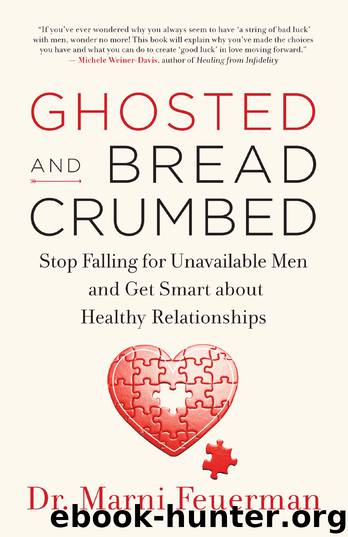Ghosted and Breadcrumbed by Dr. Marni Feuerman

Author:Dr. Marni Feuerman
Language: eng
Format: epub
Publisher: New World Library
Published: 2019-02-22T05:22:27+00:00
•What messages did you get when you expressed anger, hurt, shame, fear, and so on?
•Were there certain feelings you were not allowed to express or share?
•Did you have someone there to help you make sense of negative things that may have happened to you?
•Did you have someone there to comfort you when you had emotional distress?
•When you expressed emotional needs, such as the need for comfort, reassurance, attention, and affection, was it safe to do so?
•Were the responses appropriate and consistent?
•Did your parents express emotion, caring, and love clearly and effectively? If not, why do you think this happened?
•What do you know about your parents’ FOO history that may have influenced their ability to respond to you adequately?
Take some time to reflect on these questions. Allow yourself to be curious about the emotional influences during your life. If it is helpful, you may use a journal to write down what comes to mind. It is okay to jot down your thoughts as you reflect upon these questions over time.
Let’s look at the instance of little Joey. Joey’s father was aloof and distant, and he showed his son little physical affection. He also criticized Joey if he ever cried, even if he got physically hurt. His mother was more loving and responded much more kindly to his expression of pain or fear. She heaped on the compassion, empathy, and care. Sometimes she would rescue him from his father’s rants. The parents’ opposite ways of dealing with Joey’s expression of needs and emotions were confusing to him. He learned that he could cry only to his mother, and that when his father was around he had to act tough and show little emotion. He began to depend excessively on his mother, often clinging to her. This would further enrage his father, who would sometimes call him a “big baby” or a “wuss.”
As an adult, Joey struggled a lot with relationships. His girlfriend thought he was a “mama’s boy.” Even as an adult, he would talk to his mom daily. He called her for advice and to vent about his relationships, and he would go home for her home-cooked meals. He also expected his girlfriends to take care of him seemingly all the time, getting sullen and withdrawn when it didn’t happen. He had difficulty being independent and reaching out to age-appropriate peers or girlfriends to get his needs met. Inside, he thought of himself as incapable and weak. Joey had internalized his early experiences with mixed emotional messages in his FOO, creating an insecure attachment style in adulthood. His response to his emotional needs (for comfort and reassurance) had become unhealthy in his adult romantic relationships.
Repetitive patterns in our experiences with emotion and the expression of emotional needs create an inner template, or mental representation, of our world, ourselves, and others. From this template, also called a working model, we develop beliefs and expectations about how we will be treated. Sometimes we create a repressed, shameful, negative self-image. We may think we are unlovable, unworthy, or undeserving.
Download
This site does not store any files on its server. We only index and link to content provided by other sites. Please contact the content providers to delete copyright contents if any and email us, we'll remove relevant links or contents immediately.
| Codependency | Conflict Management |
| Dating | Divorce |
| Friendship | Interpersonal Relations |
| Love & Loss | Love & Romance |
| Marriage | Mate Seeking |
Doing It: Let's Talk About Sex... by Hannah Witton(8558)
The 5 Love Languages: The Secret to Love That Lasts by Gary Chapman(8520)
Should I Stay or Should I Go? by Ramani Durvasula(6795)
The Road Less Traveled by M. Scott Peck(6645)
The Lost Art of Listening by Michael P. Nichols(6481)
Daring Greatly by Brene Brown(5648)
We Need to Talk by Celeste Headlee(4879)
Beartown by Fredrik Backman(4429)
Men In Love by Nancy Friday(4337)
The State of Affairs by Esther Perel(3940)
The Rules Do Not Apply by Ariel Levy(3912)
How To Win Friends and Influence People by Dale Carnegie(3778)
Reflections Of A Man by Mr. Amari Soul(3706)
The Ethical Slut by Janet W. Hardy(3508)
Algedonic by r.h. Sin(3507)
Pillow Thoughts by Courtney Peppernell(3409)
Finding My Forever by Heidi McLaughlin(3311)
He's Just Not That Into You by Greg Behrendt & Liz Tuccillo(3307)
I Love You But I Don't Trust You by Mira Kirshenbaum(3233)
